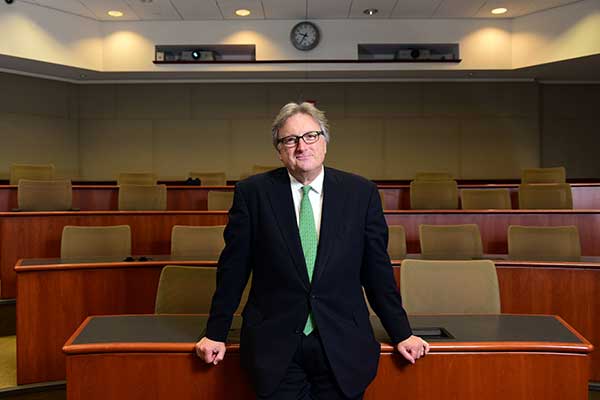
Mark Powers brings more than 30 years of financial leadership experience into the classroom.
When Mark Powers became treasurer of JetBlue Airways in 2006, the high-flying carrier was perilously close to being grounded. The airline had grown rapidly since its start in 2000, adding dozens of new city destinations and expanding its capacity with new aircraft at a rate of one every 15 days, all fueled by debt.
“We were living a classic example of unsustainable growth,” Powers says. “Despite full planes, energetic crewmembers, flattering media coverage and a near cult-like brand, we were growing ourselves to death.”
Over the next 10 years, Powers helped to engineer a remarkable turnaround for the carrier. Without resorting to the bankruptcy playbook adopted by other airlines, JetBlue slowed its growth and focused on internally generated cash to support a more focused operation. The company grew its revenue by 180%, reduced its debt ratio by 35% and improved return on invested capital by 11% to 14.8%, well over its cost of capital. JetBlue was once again soaring.
“I don’t want to say ‘mission accomplished,’ but we really did accomplish a lot,” says Powers, who became the company’s CFO in 2011. “It’s rare that you actually get to time your exit, but it was the right time.”
In September 2016, Powers announced he was retiring from JetBlue Airways to take on a new challenge: teaching the next generation of business professionals at Tulane University’s A. B. Freeman School of Business.
The transition from boardroom to classroom might sound like a stretch, but Powers says teaching was always an important part of the JetBlue culture. Senior executives were expected to engage with crewmembers, as employees were called, on a regular basis to discuss the company’s results, operations and strategy.
“On any given day, I could be welcoming 200 new crewmembers at JetBlue U in Orlando, talking to the midnight shift at a maintenance base or hosting a call-in with hundreds of crewmembers following a quarterly earnings call,” Powers says. “Most of our crewmembers owned shares and weren’t shy about asking tough questions, which generally were more insightful than the questions I got from Wall Street analysts.”
As a professor of practice in finance, Powers injects his business experience into every class. He currently teaches courses in corporate finance and valuation that draw liberally on his experience at JetBlue as well as Northwest Airlines, GE Aircraft Engines and Continental Airlines. One of his first decisions was to throw out the text book and instead use case studies, an approach that lets him focus class discussions on the issues he thinks are most relevant to prospective finance professionals.
“I treat my classes like I would a staff meeting with my team,” says Powers. “About halfway through a case discussion, I’ll ask them, ‘What are we missing? What’s really going on?’”
In one case that involved a company considering a plant expansion, Powers noted that the sponsor of the capital expenditure was the plant manager, whose job — and presumably pay — would increase if the project were approved. The lesson?
“Considering the bias of the sponsor, the projections just might be inflated,” Powers says. “When you’re the steward of the company resources, assume everyone has a personal agenda and might be gaming you.”
Unconventional takes based on real-world experience are Powers’ specialty, and he soon hopes to share them with professionals as
well. He’s currently developing a new non-degree executive education program for current, former and aspiring CFOs to address the evolving challenges of financial leadership. The inaugural Tulane CFO Forum will take place in October 2020.
Last spring, Powers returned to Freeman after taking a 15-month leave of absence to serve as CFO of Etihad Airways Group. For Powers, the experience of overseeing the financial operations for the United Arab Emirates’ second-largest airline underscored the importance and urgency of Freeman’s mission.
“The finance team at Etihad came from nearly 30 different countries, and all of them were talented, motivated and more than capable of succeeding in the U.S.,” he says. “That’s our competition — the best of the best — and it’s my job to make sure that our graduates are just as well prepared to take on the challenges of an intensely competitive global market.”

